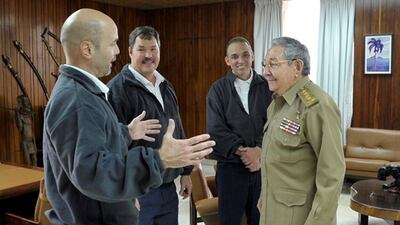Their encounter at a memorial service in Johannesburg for South African leader Nelson Mandela happened as Mr Obama strode through the dignitaries’ area. While the event created media buzz, it was dismissed at the time by Mr Obama’s deputy national security adviser, Ben Rhodes, as nothing more than a handshake.
What the world did not know was that secret negotiations had already been under way for months, with Mr Obama pursuing a deal to change the most fraught diplomatic relationship in the Western Hemisphere. The man leading the talks was Ben Rhodes – one of Mr Obama’s most trusted aides.
“These 50 years have shown that isolation has not worked,” Mr Obama said in Washington on Wednesday as he announced the rapprochement. “It’s time for a new approach.”
World leaders welcomed the groundbreaking news that the US and Cuba are moving to restore diplomatic ties and bury one of the last vestiges of the Cold War after more than 50 years of hostility.
Celebrations broke out on the streets of Havana on Wednesday as people living on a pittance in the communist-run island savoured the prospect of an end to the crippling US trade embargo and perhaps a brighter future.
The move toward normalising relations means not simply the opening of an American embassy in Havana but the easing of restrictions on limited travel and commerce that have blocked US investment in the island nation and kept connoisseurs from legally bringing Cuban cigars to US soil.
The thaw was wrapped into the release of American aid worker Alan Gross and the exchange of a US spy for three Cuban intelligence agents.
From China to Chile, plaudits rang out. South American leaders holding a trade meeting in Argentina interrupted their session and broke into euphoric applause.
The gush of praise for the shock announcement in Washington and Havana featured a plethora of terms like “turning point” and “historic day”.
The European Union, which is also moving to normalise ties with Cuba, hailed the breakthrough as a “historical turning point”.
“Today another Wall has started to fall,” said EU foreign affairs head Federica Mogherini.
In Havana, Cubans were jubilant.
“I have goosebumps all over,” said Ernesto Perez, 52, who works at a cafe in Havana’s historic city centre.
But Cuban-Americans in Miami, a hotbed of angry opposition to the Castro regime, expressed dismay.
Some Cuban exiles and Republican lawmakers decried Mr Obama’s actions, saying they would only embolden Cuban President Raul Castro to continue human rights abuses.
“I was so disappointed and frustrated when I heard the news,” said Gus Machado, 80, a Cuban-American who came to the US in 1949. “Now they have decided to be friends and forget the past, but that’s not what thousands of people died for after working all their lives to have democracy in Cuba.”
Florida Republican Senator Marco Rubio, the son of Cuban exiles, vowed to block Mr Obama’s actions.
“We’re going to have a very interesting couple of years discussing how you’re going to get an ambassador nominated and how you’re going to get an embassy funded,” said Mr Rubio, who is slated to become chairman of a panel that oversees foreign relations in the Western Hemisphere.
Florida’s Republican Lieutenant Governor, Carlos Lopez- Cantera, said Obama’s actions legitimise the “brutal dictatorship” of the Castro regime and “make it harder for the people of Cuba who are fighting for democracy”.
Mr Obama and Mr Castro praised the help given by Pope Francis, the first Latin American pontiff, and the Catholic Church in brokering better relations between the long-time enemies.
In response, the Vatican said the pope warmly congratulated both governments for overcoming “the difficulties which have marked their recent history”.
Canada was also praised for hosting secret talks between the sides.
* Bloomberg News and Agence France-Presse

